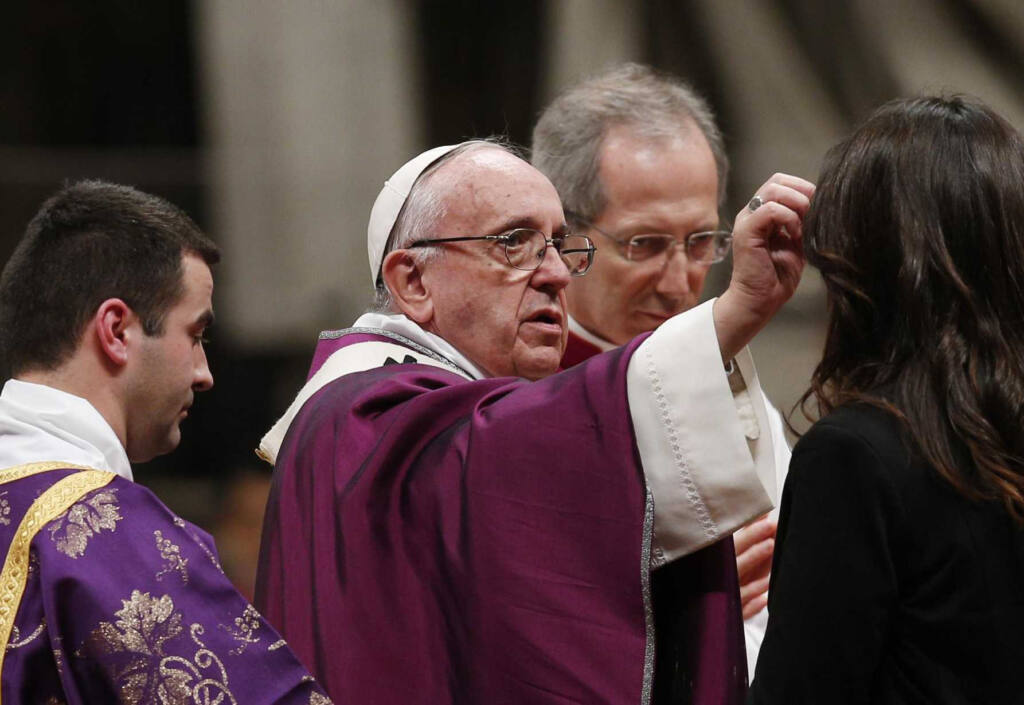VATICAN: “Slow Down and Pause in Prayer,” Pope Francis’ 2024 Lenten Message

Pope Francis Ash Wednesday 2024
Sr. Jecinter Antoinette Okoth, FSSA
The Holy Father has reminded the Catholic congregation at the commencement of the 40-day journey of Lent, that it is a time to slow down and pray.
In his 2024 Lenten message themed; “Through the desert, God leads us to freedom,” Pope Francis gives reference to the good Samaritan in the Gospel of St. Luke the Evangelist who showed a spirit of love and care to the person who was in need.
“It is time to act, and in Lent, to act also means to pause. To pause in prayer, in order to receive the word of God, to pause like the Samaritan in the presence of a wounded brother or sister,” reads part of the Pope’s message as he adds, “Slow down, then, and pause! The contemplative dimension of life that Lent helps us to rediscover will release new energies.”
He continued while emphasizing the aspect of honest love for fellow brothers and sisters saying, “Love of God and love of neighbour are one love. Not to have other gods is to pause in the presence of God beside the flesh of our neighbour. For this reason, prayer, almsgiving, and fasting are not three unrelated acts, but a single movement of openness and self-emptying, in which we cast out the idols that weigh us down, the attachments that imprison us.”
Focusing on the Book of Exodus (Ex. 20:2) when God revealed Himself to the people of Egypt and freed them from slavery, the Pontiff says that the call to freedom is a “demanding one (as) it is not answered straight away; it has to mature as part of a journey.”
“Just as Israel in the desert still clung to Egypt often longing for the past and grumbling against the Lord and Moses today too, God’s people can cling to an oppressive bondage that it is called to leave behind,” reads the Lenten message in parts.
The oppression in society he says can be realized during those moments when “we feel hopeless, wandering through life like a desert and lacking a promised land as our destination.”
In this case, the Pope narrates, Lent therefore is the “season of grace in which the desert can become once more in the words of the prophet Hosea the place of our first love (Hos. 2:16-17),” where “God shapes his people, he enables us to leave our slavery behind and experience a Passover from death to life. Like a bridegroom, the Lord draws us once more to himself, whispering words of love to our hearts.”
The Head of the Catholic Church acknowledges that exodus from slavery to freedom is no abstract journey, and therefore “If our celebration of Lent is to be concrete, the first step is to desire to open our eyes to reality,” just as when God called Moses out from the burning bush he proved that He was a God who sees and hears when he said, “I have observed the misery of my people who are in Egypt; I have heard their cry on account of their taskmasters. Indeed, I know their sufferings, and I have come down to deliver them from the Egyptians, and to bring them up out of that land to a good and broad land, a land flowing with milk and honey,” (Ex 3:7-8).
Noting that in contemporary society the cry of so many oppressed brothers and sisters rise to heaven the Pope posed a concern, “Do we hear that cry? Does it trouble us? Does it move us?”
Rather he narrates, “All too many things keep us apart from each other, denying the fraternity that, from the beginning, binds us to one another.”
In the spirit of the ongoing Synod on Synodality in the Church, the Pope says “Lent is also a time of communitarian decisions, of decisions, small and large, that are counter current. Decisions capable of altering the daily lives of individuals and entire neighborhoods, such as the ways we acquire goods, care for creation, and strive to include those who go unseen or are looked down upon.”
The Pope therefore invites every Christian community “to offer its members moments set aside to rethink their lifestyles, times to examine their presence in society and the contribution they make to its betterment.”


